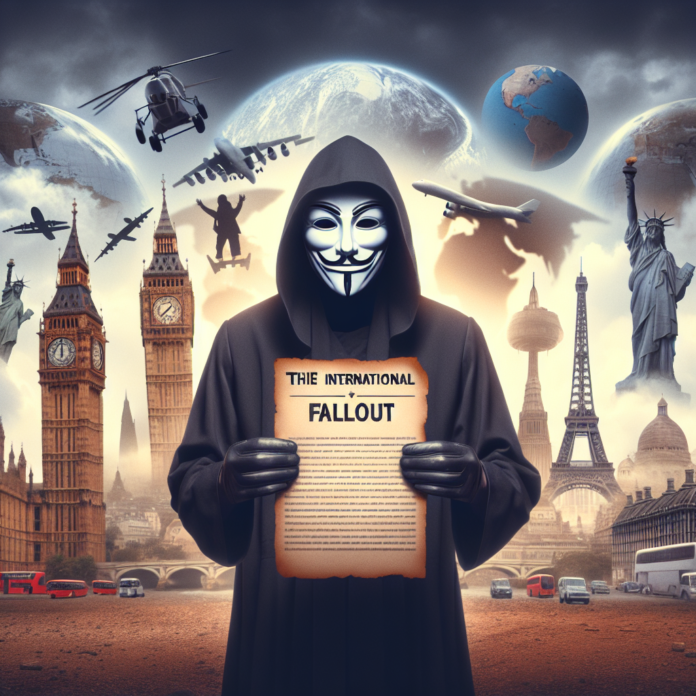The International Fallout from Bishop Viganò’s Claims Against the Vatican: A Progressive Perspective
The Roman Catholic Church, a globally influential institution, has often found itself at the epicenter of considerable internal and external scrutiny. Among the myriad controversies that have raged within its hallowed walls, few have engendered such global attention and division as the allegations lodged by Archbishop Carlo Maria Viganò against the Vatican. These claims, which indict high-ranking Church officials regarding their handling of sexual abuse cases, have reverberated internationally, sowing seeds of discord and evoking a sharp dichotomy between Catholic traditionalists and progressives.
The Nature of Viganò’s Allegations
In August 2018, Viganò, the former Apostolic Nuncio to the United States, released a 7,000-word dossier implicating Pope Francis and other senior Vatican officials in covering up sexual misconduct by Theodore McCarrick, the disgraced former Cardinal Archbishop of Washington, D.C. Viganò’s allegations suggested that Pope Francis had been aware of McCarrick’s transgressions and yet turned a blind eye, thereby perpetuating a culture of secrecy and impunity.
To add a layer of complexity, Viganò’s claims were not merely a critique of a specific moral and administrative failure but were also a broader indictment against what he perceives as the liberalizing liberalizing trends within the Church under Pope Francis. This has prompted a schism, pitting traditionalists—often staunch supporters of the pre-Vatican II practices such as the Latin Mass—against reformists who endorse the Pope’s efforts to render the Church more inclusive and responsive to contemporary challenges.
Historical Context: Reform Versus Tradition
To understand the vast implications of Viganò’s allegations, one must first grasp the historical context in which this drama unfolds. The Second Vatican Council (1962-1965) marked a significant pivot in the Catholic Church’s approach to worship, social justice, and engagement with the modern world. Initiated under Pope John XXIII and continued under Pope Paul VI, the Council sought to address an anachronistic Church by promoting the vernacular liturgy, encouraging lay participation, and embracing a more open dialogue with other religions and secular ideologies.
However, this period of modernization was met with resistance from a faction of Catholics who perceived these changes as dilutions or even betrayals of sacred traditions. This tension between reformist and traditionalist elements has endured over the decades, exploding anew under the papacy of Pope Francis. His progressive agenda, advocating for environmental stewardship, economic equality, and inclusivity, especially towards the LGBTQ community, has ruffled feathers among conservative Catholics who yearn for a return to pre-conciliar orthodoxy.
The Global Repercussions
Viganò’s document has had a profound international fallout, eliciting responses from across the globe. In North America and Europe, the allegations have invigorated traditionalist factions, providing them with a narrative that positions Pope Francis and his allies as enablers of moral laxity. These groups, often devotees of the Latin Mass and adherents to orthodox doctrines untainted by modernity, have leveraged Viganò’s claims to declare a moral and theological crisis within the Church.
In contrast, progressive Catholics have predominantly dismissed Viganò’s accusations as politically charged and tainted by his ultra-conservative agenda. Progressive figures within the Church argue that the real crisis lies not in the alleged liberalizing policies of Pope Francis, but in the long-standing culture of clericalism and secrecy that exists within the traditionalist factions. They believe that Pope Francis’ commitment to transparency and accountability represents a genuine effort to combat these endemic issues.
The Role of Media and Public Perception
Media coverage of the Viganò affair has further accentuated these divisions. Right-leaning outlets have often amplified Viganò’s claims, portraying him as a whistleblower hero confronting an allegedly corrupt liberal hierarchy. Conversely, more liberal publications have cast Viganò’s actions as a vendetta driven by his discontent with the progressive direction of the Church. Each side, in effect, uses the scandal to fortify its preconceived notions, thereby polarizing public opinion and exacerbating divisions within the Church.
The Way Forward
In the wake of this scandal, the enduring question remains: what is the path forward for the Catholic Church? Pope Francis has responded to Viganò’s allegations with a call for prayer and discernment, sidestepping direct confrontation and emphasizing a spiritual approach to resolving the crisis. This response has been lauded by progressives as an embodiment of humility and patience, virtues which they argue are essential to real reform.
Moreover, Pope Francis has intensified efforts to decentralize Church authority, bolstering the role of local bishops in addressing issues such as sexual abuse. This decentralization is aimed at fostering greater accountability and tackling the culture of clericalism that Viganò himself had criticized, albeit from a starkly different perspective.
Conclusion
The international fallout from Bishop Viganò’s claims against the Vatican not only underscores the deep-seated divisions within the Catholic Church but also spotlights the broader struggle between tradition and progress. While traditionalists clamor for a return to the “true” Church they perceive is being eroded under Pope Francis, progressives maintain that the Pope’s vision represents an essential evolution towards a more inclusive and socially engaged institution. As the Catholic Church navigates these turbulent waters, its future will likely hinge on its ability to balance reverence for tradition with a compassionate embrace of modernity and change.
In the long run, it is the progressive values of transparency, inclusivity, and accountability that promise to lead the Church out of scandal and into a new era of spiritual and moral integrity.
